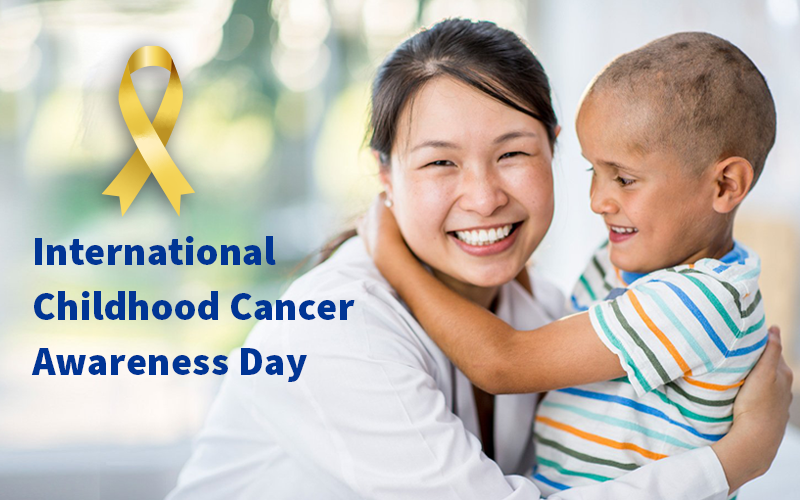
By: Trish Adkins
The number of children diagnosed with cancer each year, around the world, is hard to estimate. The best estimate, from the World Health Organization, is more than 400,000. But, without a comprehensive, global childhood cancer registry, knowing the true numerical impact is difficult.
But what we do know is that childhood cancer happens everywhere. It happens in the United States and it happens in Germany and it happens in Kenya. There is not one country in the world that is untouched by childhood cancer. A study in 2017 estimated that each year cancer stole 11.5 million years of healthy life away from children. This is time that could be spent in school or on the playground, but instead is spent enduring harsh treatments, waiting for miracle cures and hoping that tomorrow will be symptom-free.
If all children received adequate care and could access treatment, and if there were more cures and safer treatments, imagine how many healthy years these kids could get back.
Childhood cancer happens everywhere. But, so does the science that will lead to cures and safer, more effective treatments.
Alex’s Lemonade Stand Foundation (ALSF) works to foster global collaboration, resource sharing and project funding aimed at making treatments available to all children. ALSF has funded over 1,000 in medical research grants at nearly 150 institutions. The grants provide early career scientists and later career scientists with critical funds to study basic science and also to bring bench research from the lab to the clinic.
Here are three ways scientists are collaborating for cures for childhood cancer:
1. Data and resource sharing
Childhood cancer research is powered by data but it also produces mass amounts of data. All this incredible information — related to cancer cell biology and genetics as well as potential compounds that could become future treatments. Sharing data can help researchers accelerate their research and support collaboration and discussion, which is why ALSF funds the Childhood Cancer Data Lab. Established in 2017, the Data Lab complements the rich ecosystem of pediatric cancer research supported by ALSF by providing open-source tools and training to pediatric cancer researchers. The Data Lab fosters collaboration internationally, by leveraging the incredible expertise of their internal team that is made up of leaders in the fields of data management, user experience design, programming and analysis.
Beyond the data lab, ALSF also funds the Childhood Cancer Cell Repository in Lubbock, Texas. The Repository, in collaboration with the Children’s Oncology Group, stores donated childhood cancer tumors, turning those tumors into cell lines and special “PDX” models, which researchers all around the world can request and use to power their lab research. Over the past ten years, the Repository collected 1,404 cancer specimens from children with cancer, enabling the generation of 640 continuous cell lines and 124 PDX models from childhood cancers to provide over 600 scientists with cell lines or models in over 30 countries.
2. Addressing issues in equity and access
Accessing cancer treatment is a challenge in low and middle-income countries without comprehensive medical infrastructures. Two ALSF-funded researchers have been working throughout Africa to change the reality for children facing cancers. Dr. Terry Vik, who was funded by ALSF with an Epidemiology grant, studied and then trained medical workers at malaria clinics in Kenya to recognize leukemia on the blood smears they used to diagnose malaria — leading to earlier diagnoses. Dr. David Poplack, who was honored with the ALSF Childhood Cancer Lifetime Achievement Award in 2020, leads Global HOPE which has a presence in eight African countries and works to train local health care professionals in diagnostics and treatment, while also providing treatment to thousands of children with childhood cancer.
3. Multi-disciplinary, global research teams
Because childhood cancer happens everywhere, research needs to be collaborative across oceans. ALSF’s Crazy 8 Grant funding addresses the most difficult, pressing issues in childhood cancer research by providing funding to international, collaborative teams. There are six teams in total with researchers from 21 institutions. Later this year, the Foundation will award another grant team that will study cancer predisposition, another pressing and challenging problem in pediatric oncology. Estimates of how many children have a predisposition to cancer vary — but at least 30% of children with cancer have some sort of predisposition to cancer whether the result of an inherited syndrome or a germline mutation.
The key to these teams’ success is in the collaboration. Teams are studying Ewing sarcoma and osteosarcoma, tracing the cellular origins and history of leukemia, employing molecular glues and cellular barcoding, and collaborating every day for cures for all kids no matter where they live.
Alex’s Lemonade Stand Foundation founder Alex Scott believed that if we all work together, we would find cures for childhood cancer. As researchers continue to move closer to cures for all children, there are still types of childhood cancer that continue to be incurable. To accelerate childhood cancer research, ALSF has developed the Crazy 8 Initiative, a $50 million commitment to solve the most intractable problems in childhood cancers. The $50 million will fund at least 10 game-changing collaborative projects that connect researchers across the globe. We have already raised and allocated the first $25 million toward six projects that are taking on the deadliest of childhood cancers with one singular focus: curing the incurable.

